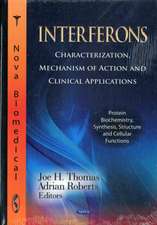Epigenetic Regulation of Lymphocyte Development: Current Topics in Microbiology and Immunology, cartea 356
Editat de Cornelis Murreen Limba Engleză Paperback – 22 feb 2014
| Toate formatele și edițiile | Preț | Express |
|---|---|---|
| Paperback (1) | 1089.12 lei 43-57 zile | |
| Springer Berlin, Heidelberg – 22 feb 2014 | 1089.12 lei 43-57 zile | |
| Hardback (1) | 1094.25 lei 43-57 zile | |
| Springer Berlin, Heidelberg – 13 ian 2012 | 1094.25 lei 43-57 zile |
Din seria Current Topics in Microbiology and Immunology
- 18%
 Preț: 962.03 lei
Preț: 962.03 lei - 5%
 Preț: 1123.13 lei
Preț: 1123.13 lei - 5%
 Preț: 1085.95 lei
Preț: 1085.95 lei -
 Preț: 499.77 lei
Preț: 499.77 lei - 5%
 Preț: 967.81 lei
Preț: 967.81 lei - 18%
 Preț: 1118.62 lei
Preț: 1118.62 lei - 5%
 Preț: 717.00 lei
Preț: 717.00 lei - 5%
 Preț: 712.97 lei
Preț: 712.97 lei - 5%
 Preț: 709.51 lei
Preț: 709.51 lei - 5%
 Preț: 709.51 lei
Preț: 709.51 lei - 5%
 Preț: 721.19 lei
Preț: 721.19 lei - 5%
 Preț: 359.78 lei
Preț: 359.78 lei - 5%
 Preț: 711.88 lei
Preț: 711.88 lei - 5%
 Preț: 774.81 lei
Preț: 774.81 lei - 15%
 Preț: 640.06 lei
Preț: 640.06 lei - 5%
 Preț: 717.00 lei
Preț: 717.00 lei - 5%
 Preț: 360.34 lei
Preț: 360.34 lei - 5%
 Preț: 707.69 lei
Preț: 707.69 lei - 5%
 Preț: 717.56 lei
Preț: 717.56 lei - 5%
 Preț: 716.28 lei
Preț: 716.28 lei - 5%
 Preț: 717.20 lei
Preț: 717.20 lei - 5%
 Preț: 711.32 lei
Preț: 711.32 lei - 5%
 Preț: 711.88 lei
Preț: 711.88 lei - 5%
 Preț: 718.29 lei
Preț: 718.29 lei - 5%
 Preț: 709.51 lei
Preț: 709.51 lei - 5%
 Preț: 369.84 lei
Preț: 369.84 lei - 5%
 Preț: 712.25 lei
Preț: 712.25 lei - 5%
 Preț: 716.45 lei
Preț: 716.45 lei - 5%
 Preț: 706.60 lei
Preț: 706.60 lei - 5%
 Preț: 711.52 lei
Preț: 711.52 lei - 5%
 Preț: 713.54 lei
Preț: 713.54 lei - 5%
 Preț: 720.47 lei
Preț: 720.47 lei - 5%
 Preț: 725.42 lei
Preț: 725.42 lei - 5%
 Preț: 708.06 lei
Preț: 708.06 lei - 5%
 Preț: 713.70 lei
Preț: 713.70 lei - 5%
 Preț: 705.83 lei
Preț: 705.83 lei - 5%
 Preț: 710.96 lei
Preț: 710.96 lei - 5%
 Preț: 723.93 lei
Preț: 723.93 lei - 5%
 Preț: 707.69 lei
Preț: 707.69 lei - 5%
 Preț: 715.35 lei
Preț: 715.35 lei - 5%
 Preț: 709.87 lei
Preț: 709.87 lei - 5%
 Preț: 359.05 lei
Preț: 359.05 lei - 5%
 Preț: 374.20 lei
Preț: 374.20 lei - 15%
 Preț: 635.31 lei
Preț: 635.31 lei - 5%
 Preț: 707.86 lei
Preț: 707.86 lei - 5%
 Preț: 721.96 lei
Preț: 721.96 lei - 15%
 Preț: 632.88 lei
Preț: 632.88 lei - 15%
 Preț: 632.05 lei
Preț: 632.05 lei - 15%
 Preț: 642.83 lei
Preț: 642.83 lei
Preț: 1089.12 lei
Preț vechi: 1146.44 lei
-5% Nou
Puncte Express: 1634
Preț estimativ în valută:
208.43€ • 216.80$ • 172.07£
208.43€ • 216.80$ • 172.07£
Carte tipărită la comandă
Livrare economică 14-28 aprilie
Preluare comenzi: 021 569.72.76
Specificații
ISBN-13: 9783642447679
ISBN-10: 3642447678
Pagini: 204
Ilustrații: X, 194 p.
Dimensiuni: 155 x 235 x 11 mm
Greutate: 0.29 kg
Ediția:2012
Editura: Springer Berlin, Heidelberg
Colecția Springer
Seria Current Topics in Microbiology and Immunology
Locul publicării:Berlin, Heidelberg, Germany
ISBN-10: 3642447678
Pagini: 204
Ilustrații: X, 194 p.
Dimensiuni: 155 x 235 x 11 mm
Greutate: 0.29 kg
Ediția:2012
Editura: Springer Berlin, Heidelberg
Colecția Springer
Seria Current Topics in Microbiology and Immunology
Locul publicării:Berlin, Heidelberg, Germany
Public țintă
ResearchTextul de pe ultima copertă
Previous observations, generated by many in the field, have provided a first glimpse into the epigenetic mechanisms that underpin lymphocyte and myeloid development. We are only now beginning to merge the multitude of observations into a common framework. At the same time it has become more difficult for the individual mind to comprehend more than a tiny focused fraction of it. The studies described in this volume serve as a starting point to familiarize one self with the multifarious differences in epigenetic designs that orchestrate the progression of developing blood cells. They also may serve as a general paradigm for the mechanisms that underpin the control of eukaryotic gene expression.
Caracteristici
Includes supplementary material: sn.pub/extras










